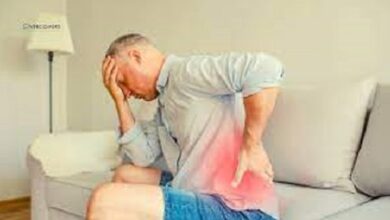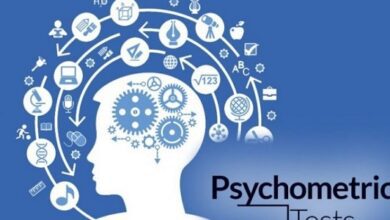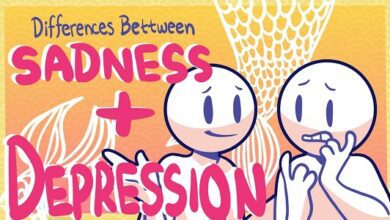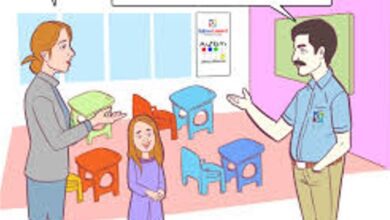Difference between depression and anxiety Similarities and FAQs
Depression and anxiety
In this article we will provide you the difference between depression and anxiety Similarities and FAQs.
what does depression mean
Depression is a mental disorder that can affect the way people feel, think, and act . It can cause profound and significant emotional changes in a person’s daily behavior, such as persistent feelings of sadness or discouragement, lack of interest or pleasure in things once enjoyed, extreme tiredness, and difficulty falling asleep. Depression is also associated with cognitive problems such as negative thoughts about oneself, low self-esteem, and difficulty making decisions. In some severe cases, the symptoms include suicidal attempts or other self-destructive behaviors.
What does anxiety mean
Anxiety is a normal emotional response to stressful situations, involving worry and fear. It is characterized by feelings of muscular tension, mental restlessness, and physiological alertness. Anxiety is felt when there is something threatening or uncertain on the horizon. Obsessive thoughts may arise that lead to restlessness and emotional discomfort. Sometimes it interferes with the ability to concentrate or make good decisions; it can even lead to panic attacks and significant interference in daily activities. Thus, it is understood as a chronic mood disorder caused by many different things: from stress to personal problems through biological and genetic factors.
Similarities Between Depression and Anxiety
The words depression and anxiety are clinical terms Chinese . In addition, it was used to describe two different mental disorders, but they share some similarities.
- Both are characterized by feelings of hopelessness, boredom, sadness, or excessive worry.
- Physical symptoms include chronic fatigue, sleep problems, and loss of appetite or overeating.
- Both conditions are also related to social anxiety, fear of new situations, and a tendency to avoid any particular activity.
- However, there are some important differences between the two: depression is often a more serious chronic illness that requires prescription drugs; on the other hand, anxiety is usually minor and can be controlled without medication.
Differences between depression and anxiety
Depression and anxiety are two similar but also different emotional states.
- Depression is characterized by deep sadness accompanied by feelings of hopelessness and emptiness, which can last for weeks and even months without relief.
- On the other hand, anxiety is the result of intense worries caused by excessively negative thoughts about future situations.
- This sensation usually comes with physical symptoms such as rapid heartbeat, dizziness, and excessive sweating.
- Although both conditions are mood disorders that require professional help to overcome, the treatments differ depending on the diagnosis made by a qualified professional.
Frequent questions
What causes depression?
Depression is a mental disorder that can have a number of causes, including a combination of physical and emotional factors. These include hormonal changes, genetics, negative thinking styles, and relationship problems or difficult situations. Depression is also associated with some chronic diseases such as HIV/AIDS, cancer, and Alzheimer’s disease.
What are the symptoms of depression?
Symptoms of depression include persistent feelings of sadness, hopelessness, and/or emptiness; lack of interest in activities that were previously pleasurable; significant changes in appetite or weight; trouble sleeping (insomnia) or staying asleep (hypersomnia); increased tiredness and decreased energy; difficulty concentrating, remembering details, or making decisions; excessive or unnecessary guilt, negative thoughts about self and others; slowed body movements, slow speech, or visible motor agitation. It can also include recurring feelings of death and suicidal ideation.
What is depression and how is it removed?
Depression is a mental disorder characterized by persistent feelings of sadness, hopelessness, and helplessness. It can affect a person’s ability to enjoy everyday things and perform normal activities. For some people, depression can be so severe that it interferes with daily life. There is no easy solution to remove depression; treatment depends on the type and severity of symptoms. Prescription drugs are common in the treatment of depression, but there are also psychological therapies such as cognitive behavioral therapy (CBT) or dialectical behavioral therapies (DBT). In addition, there are many resources available to help people learn useful skills to deal with the symptoms of depression without the need for medication.
What does it feel like when you have anxiety?
Feeling anxious can be very unnerving and scary. Many people experience a feeling of anxiety, worry, or discomfort, along with a strong feeling of fear and tightness in their chests. They may have difficulty breathing normally and feel as if they are trapped with no way out. Some may even feel paralyzed with anxiety. Other physical symptoms include cold sweat, tremors, heart palpitations, and nausea. You may also experience obsessive and irrational thoughts about situations that are generally completely safe for others.
What is it that causes anxiety?
Anxiety is a normal and common stress response to situations that are considered threatening or dangerous. It can be caused by internal problems, such as fear, depression or past traumas; or external, such as work stress, social pressure or financial concerns.
What removes anxiety?
Anxiety is a normal response to stressful situations, but when it becomes excessive or disabling it may be necessary to seek professional help. There are clinical treatments such as cognitive-behavioral therapy (CBT), which promote the change of thoughts and behaviors to reduce anxiety symptoms. There are also prescription medications available to treat severe anxiety. Lastly, some people find benefits in more natural techniques like meditating, exercising regularly, or practicing relaxation techniques.




